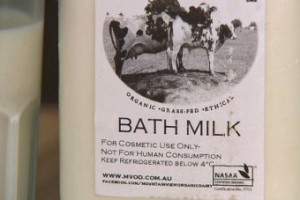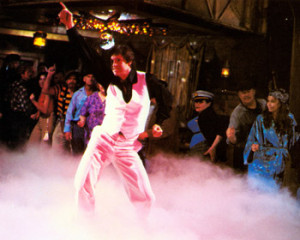Raw milk producers will be subject to tough new restrictions, making it harder to sell the product for human consumption, the Victorian Government has said.
 Under the new regulations, dairy farmers producing milk must either make it safe for human consumption or make it unpalatable by adding a bittering agent.
Under the new regulations, dairy farmers producing milk must either make it safe for human consumption or make it unpalatable by adding a bittering agent.
“Raw milk producers will have to either treat the milk with a pasteurisation process to make sure that any harmful bacteria are killed before there is a risk that consumers will drink it,” Victorian Minister for Consumer Affairs Jane Garrett said.
“If they don’t wish to go through this pasteurisation process, they will be required to add a very small drop of an agent that makes the milk entirely unpalatable.
“This means that the smallest amount will make the individual recoil in horror, which will prevent absolutely the deliberate or accidental consumption.”
The Victorian Health Department said four other children also became ill after drinking the product.
The new rules allow manufacturers and farmers to turn raw milk into non-edible products, Ms Garrett said.
“It is used often in making soap for example, or making stock feed and that can be done without it ever gracing the shelves,” she said.
She said farmers who breached the new rules would face a fine and could have their licences cancelled.
“These new conditions will help protect Victorians from the serious risks of drinking raw unpasteurised milk,” Ms Garrett said.
“Despite the labelling of raw milk as not fit for human consumption, some Victorians have been put at risk from drinking it.
 “Raw milk has legitimate uses, but is not safe to drink. We are going to better regulate the industry to protect consumers.”
“Raw milk has legitimate uses, but is not safe to drink. We are going to better regulate the industry to protect consumers.”
Raw milk, choice and kids
28.dec.14
https://barfblog.com/2014/12/raw-milk-choice-and-kids/
In May 1943, Edsel Bryant Ford, the son of auto magnate Henry Ford, died at the age of 49 in Detroit, of what some claimed was a broken heart.
Biology, however, decreed that Ford died of undulant fever, apparently brought on by drinking unpasteurized milk from the Ford dairy herd, at the behest of his father’s mistaken belief that all things natural must be good.
Shortly thereafter, my mother – then a child — developed undulate fever, which my grandfather, with no knowledge of microbiology, attributed to the dairy cows on his farm in Ontario, Canada.
He got rid of the cows and went into potatoes, and then asparagus.
Earlier this month, the latest in a seemingly endless number of outbreaks attributed to raw or unpasteurized milk, contributed to the death of a 3-year-old in Victoria, Australia, and left at least three other children under the age of five with hemolytic uremic syndrome, a side effect of infection with shiga-toxin producing E. coli.
In addition to the personal tragedies, every outbreak raises questions about risk and personal choice.
It’s true that choice is a good thing. People make risk-benefit decisions daily by smoking, drinking, driving, and especially in Brisbane, cycling.
But the 19th-century English utilitarian philosopher, John Stuart Mill, noted that absolute choice has limits, stating, “if it (in this case the consumption of raw unpasteurized milk) only directly affects the person undertaking the action, then society has no right to intervene, even if it feels the actor is harming himself.”
Excused from Mill’s libertarian principle are those people who are incapable of self-government — children.
Society generally regulates what is allowed for children – most parents aren’t having a scotch and a smoke with their 3-year-olds.
Celebrity chefs, would-be farmers and the wannabe fashionable can devoutly state that grass-fed cattle are safer than grain-fed by spinning select scientific data — except that the feces of cattle raised on diets of grass, hay and other fibrous forage do contain E. coli O157:H7 as well as salmonella, campylobacter and others.
Ten years ago, Ontario’s former chief medical health officer, said, “Some people feel that unpasteurized milk is either not bad for their health (they don’t believe the health risks) or they actually believe that it has healing properties because it’s all natural and untainted by government interference.”
Except poop happens, especially in a barn, and when it does people, usually kids, will get sick. That’s why drinking water is chlorinated and milk is pasteurized — one more example of how science can be used to enhance what nature provided.
Yes, lots of other foods make people sick, but in the case of milk, there is a solution to limit harm – pasteurization.
Society has a responsibility to the many — philosopher Mill also articulated how the needs of the many outweighed the needs of the one — to use knowledge to minimize harm.
The only thing lacking in pasteurized milk is the bacteria that make people, especially kids, seriously ill.
Adults, do whatever you think works to ensure a natural and healthy lifestyle, but please don’t impose your dietary regimes on those incapable of protecting themselves: your kids.
Dr. Douglas Powell is a former professor of food safety in Canada and the U.S. who now resides in Brisbane and publishes barfblog.com
0478 222 221
dpowell29@gmail.com



.jpg) Flowerdale north of Melbourne, and the other in Gippsland in Victoria’s south east.
Flowerdale north of Melbourne, and the other in Gippsland in Victoria’s south east..jpg) symptoms, according to hotel management.
symptoms, according to hotel management..jpeg) crook from chicken parmigiana at a hotel.
crook from chicken parmigiana at a hotel.(1).jpeg) overhaul of the business’s food-handling procedures.
overhaul of the business’s food-handling procedures.